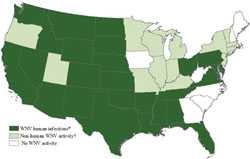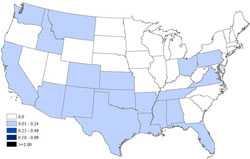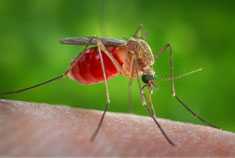West Nile Virus

Don’t let mosquitoes wreck your summer fun. Protect yourself and your family from mosquito bites.
Summertime means mosquitoes and West Nile virus season. An infected mosquito bite can make you or a family member sick with West Nile virus. Stay healthy this summer. Take steps to avoid mosquito bites, especially in from evening to morning when the mosquitoes that spread West Nile virus are most active.
How many people get sick with West Nile virus?
Nearly 44,000 cases of West Nile virus disease (West Nile virus) have been reported in the United States since 1999. Of those, over 20,000 people have had infections of the brain or spinal cord and more than 1,900 people have died. Many more cases of illness are not reported to CDC.

Figure 1. West Nile virus activity by state in the United States, 2016. View Map.
See detailed case counts by state for 2015 [104 KB].

Figure 2. West Nile virus neurologic disease incidence reported to ArboNET by state in the United States, 2016. View Map.
What are the risks?
In 2015, 44 states and the District of Columbia in the continental United States have reported 2,175 cases of West Nile virus in people. Depending on the year, some states report more West Nile cases than others. Some areas of the United States also report cases of other viruses spread by mosquitoes, such as eastern equine encephalitis virus or La Crosse encephalitis virus.
Though anyone can get infected with West Nile virus, some people are at higher risk for infection of the brain or spinal cord. For example, people over the age of 50 are at higher risk for encephalitis (swelling of the brain).
What are the symptoms of a West Nile virus infection?
No symptoms in most people
Most people (70-80%) who become infected with West Nile virus do not have any symptoms.
Fever in some people
About 1 in 5 people who are infected will develop a fever with other symptoms such as headache, body aches, joint pains, vomiting, diarrhea, or rash. Most people with this type of West Nile virus recover completely, but feeling tired and weak can last for weeks to months.
Severe symptoms in a few people
Less than 1% of people who are infected will develop a serious neurologic illness such as encephalitis or meningitis (inflammation of the lining of the brain and spinal cord). The symptoms of neurologic illness can include headache, high fever, neck stiffness, disorientation, coma, tremors, seizures, or paralysis. See your healthcare provider if you think you have symptoms of West Nile virus.

Why risk a severe illness this summer? Take steps to avoid West Nile virus infection.
How do I protect myself from West Nile virus?
There is no vaccine to prevent West Nile virus infection.
The best way to prevent diseases spread by mosquitoes is to protect yourself and your family from mosquito bites.
- Wear long-sleeved shirts and long pants.
- Stay in places with air conditioning and window and door screens to keep mosquitoes outside.
- Treat your clothing and gear with permethrin or buy pre-treated items.
- Use Environmental Protection Agency (EPA)-registered insect repellents.
- Always follow the product label instructions.
- When used as directed, these insect repellents are proven safe and effective even for pregnant and breastfeeding women.
- Do not use insect repellents on babies younger than 2 months old.
- Do not use products containing oil of lemon eucalyptus or para-menthane-diol on children younger than 3 years old.
- Mosquito netting can be used to cover babies younger than 2 months old in carriers, strollers, or cribs to protect them from mosquito bites.
- Sleep under a mosquito bed net if air conditioned or screened rooms are not available or if sleeping outdoors.
If you have a baby or child:
- Do not use insect repellent on babies younger than 2 months old.
- Do not use products containing oil of lemon eucalyptus or para-menthane-diol on children younger than 3 years old.
- Dress your child in clothing that covers arms and legs.
- Cover crib, stroller, and baby carrier with mosquito netting.
- Do not apply insect repellent onto a child’s hands, eyes, mouth, and cut or irritated skin.
- Adults: Spray insect repellent onto your hands and then apply to a child’s face.
- Page last reviewed: August 26, 2016
- Page last updated: August 26, 2016
- Content source:
- National Center for Emerging, Zoonotic, and Infectious Diseases, Division of Vector-Borne Diseases
- Page maintained by: Office of the Associate Director for Communication, Digital Media Branch, Division of Public Affairs




 ShareCompartir
ShareCompartir